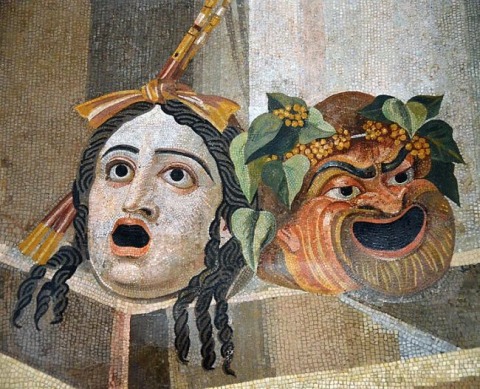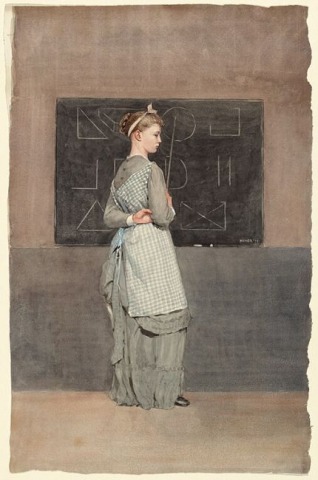
The Underground Thomist
Blog
Thus Did He EnterMonday, 12-25-2023
He had no earthly father; He abhorred to have one. The thought may not be suffered that He should have been the son of shame and guilt. He came by a new and living way; not, indeed, formed out of the ground, as Adam was at the first, lest He should miss the participation of our nature, but selecting and purifying unto Himself a tabernacle out of that which existed. As in the beginning, woman was formed out of man by Almighty power, so now, by a like mystery, but a reverse order, the new Adam was fashioned from the woman. He was, as had been foretold, the immaculate "seed of the woman," deriving His manhood from the substance of the Virgin Mary; as it is expressed in the articles of the Creed, "conceived by the Holy Ghost, born of the Virgin Mary." Thus the Son of God became the Son of Man; mortal, but not a sinner; heir of our infirmities, not of our guiltiness; the offspring of the old race, yet "the beginning of the" new "creation of God.” .... Thus did the Son of God enter this mortal world; and when He had reached man's estate, He began His ministry, preached the Gospel, chose His Apostles, suffered on the cross, died, and was buried, rose again and ascended on high, there to reign till the day when He comes again to judge the world. This is the All-gracious Mystery of the Incarnation, good to look into, good to adore. -- From a sermon by St. John Henry Newman on John 1:14
|
Happier Unhappy?Monday, 12-18-2023
Query:My students have just finished your book How and How Not to be Happy. They all really liked it. Several, some of them atheists, emailed me privately that the book helped them rethink their lives and values in a positive way. One told his mom to listen to it in the audio version. However, several did have questions and objections. In particular, what would you say about people who claim they don't experience the desire for complete happiness? And what would you say about people who seem to be perfectly happy but are atheists?
Reply:I’m glad they liked the book! Concerning their first question or objection, “What would you say about people who claim they don't experience the desire for complete happiness?” Let me ask in turn, if they don’t desire that kind of happiness, then what kind do they desire? Partial, flawed, and precarious happiness? I don’t believe it. Complete happiness means happiness so perfect that it leaves nothing further to be desired. Do they not desire that? They may not be pining away, saying “More, more, more!” But I don’t think they are pleading, “Okay, I’m happy enough now! Don’t make me any happier, I’m begging you!” Just like everyone else, people who speak as they do desire complete happiness -- but for fear of disappointment, they are trying not to desire it. They say they “don’t experience the desire for” complete happiness because they are trying to resign themselves to not having all that they could wish. They think they will be happier if they “settle.” Concerning the second question or objection, “What would you say about people who seem to be perfectly happy but are atheists?” -- I wouldn’t dream of denying that an atheist might have the partial, flawed, precarious happiness of this life. The closest formula for that is good character along with good fortune – as I put it in the book, virtue plus luck. But of course none of us has as much virtue as he needs, and the thing about luck is that it tends to run out. But really -- perfectly happy? If anyone did claim that he couldn’t be any happier than he already was, I would say that he didn’t have much imagination. I don’t even claim perfect happiness for theists in this life, because the happiness of the blessed will not be complete until we see God. They will be perfectly happy only when we are face to face with the very source of all meaning and happiness, who redeems even our present suffering. For now, we live in hope and longing. Maybe that’s a good note on which to end this Advent post. Related:How and How Not to Be Happy“God Rest Ye Merry, Melancholics”
|
BeerismMonday, 12-11-2023
Advertisements are well worth analyzing, since they make up so much of our education. Recently I passed by a billboard showing a photograph of people who had climbed ‘way up into the hills, and now, late in the day, were having a beer. The motto: “It isn't worth it unless you enjoy it.” I’ll bet the flacks who composed the slogan never expected anyone to disagree. Well, I have been known to have a beer with friends too (I like stout). But think about that motto. “It,” I suppose, means whatever one aims to achieve. Replace that vague word with an actual achievement. Your pick. It isn’t worth changing the baby’s diaper unless you enjoy it. It isn’t worth getting off drugs unless you enjoy it. It isn’t worth learning to read unless you enjoy it. It isn’t worth being kind to the old lady next door unless you enjoy it. It isn’t worth driving carefully unless you enjoy it. Hmm. How would the philosophy of beerism be expressed as a syllogism? Perhaps something like this. 1. Nothing is good except pleasure. 2. What you achieve doesn’t ever give you pleasure in itself. 3. Therefore it is pointless to achieve anything unless you are rewarded with some other unrelated pleasure, such as beer. But really: Lots of things are good besides pleasure. Difficult achievements usually do give you pleasure in themselves. It can be fun to enjoy a beer with friends when you have achieved something together, but it isn’t the beer that makes the achievement worth doing. And you could have had the beer without doing it. You aren’t celebrating the beer. You are enjoying the beer to celebrate the achievement.
|
NarcissusMonday, 12-04-2023
Recently I came across this unintentionally revealing statement by actress Drew Barrymore. “Being with a woman,” she said, “is like exploring your own body, but through someone else". Exactly.
|
Where Is Justice in Natural Law?Monday, 11-27-2023
Query:I am wondering how justice fits with traditional definitions of natural law. Aquinas mentions five fundamental natural law precepts, namely life, the procreative union of male and female, the education of the young, living in society, and the worship of God. Most natural law thinkers would also state that justice is a key principle of the natural law. However, it does not seem to me to be clearly stated within Aquinas’s fundamental precepts or to fit neatly with them. Reply:Very good question, but I think you have this difficulty with St. Thomas only because of a misreading – a common one. In the place in the Summa theologiae I think you have in mind, he says that the order of the precepts of natural law corresponds to the order of the natural inclinations, and he speaks of three inclinations – the inclination we share with all substances, the inclination we share with all animals, and the inclination which pertains more particularly to our rationality. You would think, then, that there should be only three fundamental precepts. The reason there are more than three is that his term “inclination” refers not to particular inclinations, as we would use the word “inclination,” but to broad categories of inclinations. These categories are pretty broad. In speaking of what we share with animals, for example, he gives two examples -- sexual intercourse and the education of offspring, as you note – but then he says “and so forth.” Rightly so, because we share a great many other things with other animals too, such as learning from sense impressions. Then, in speaking of our rationality, he mentions the inclination to seek the truth, especially the truth about God, as well as the inclination to live in society. Although this time he doesn’t say “and so forth,” once again these are just examples; they don’t exhaust the set of inclinations we have because of rationality. For instance, only a rational creature seeks beauty and tries to be witty. To back up for a moment, it’s pretty obvious how the inclination to know the truth is connected with rationality. But how is the inclination live in society connected with it? After all, don’t cows live in herds, and don’t birds live in flocks? And they certainly aren’t rational. Upon reflection, though, one realizes that what St. Thomas means here by society isn’t just how cows and birds hang around together, but partnership in a life shaped by truth and rational principle, something the beasts can’t enjoy. And now things really get interesting, because among the rational principles essential to such a partnership is justice, which is equal treatment of those who are equal in the relevant respects. So yes, we do have a natural inclination to seek justice -- and doing so is a fundamental precept of natural law. My correspondent had continued:I suppose there are two possibilities: one, that Aquinas’s definition needs to be supplemented by an additional precept, which leaves open the possibility that there are additional primary precepts of the natural law. I can imagine that this is an unattractive prospect for someone in the Thomist tradition! Reply:As you now know, this Thomist thinks there are lots of other primary precepts -- and that the prospect is not at all unattractive! To avoid getting St. Thomas wrong, it’s important to keep in mind his fondness for the figure of speech called metonymy: He often uses the most conspicuous instances of things as placeholders for entire sets of things, and this is what he is doing when he speaks of our inclinations. My correspondent had again continued:Another possibility is that justice is inherently related to the precept about human sociability. Because we have an inherent need to live in society, and we ought to do to others what we would have done to us, it follows that we ought to give every person his due. From this we could presumably deduce principles about impartiality, procedural fairness, etc. Reply:Right! And you know I agree, because your remark anticipates what I wrote a few lines above. Related:Commentary on Thomas Aquinas's Treatise on Law
|
On Doing What Comes NaturallyMonday, 11-20-2023
Query:The sources I’ve read say that according to Thomas Aquinas, human nature is characterised by certain natural dispositions or inclinations which need to be realized. Would you say that this accurately characterizes his view? The reason I ask is that it follows that whatever impedes the fulfilment of natural capacities is inherently evil. But this seems to prove too much. For instance, on this account the celibacy of a nun or a priest would be inherently evil, because it impedes the fulfilment of the natural tendency to procreate. If the view I’ve described is correct, then it might illuminate a key difference between Protestant and Roman Catholic approaches to sexual ethics. For instance, it seems to me that it is good to have children, and we have a natural tendency to do so, but it does not follow that every sexual act must be procreative or potentially procreative.
Reply:As to your first question: Thomas Aquinas does hold that for any given nature -- such as a human being -- the good is that to which it is naturally inclined, that which its very nature disposes it to seek. So far, so good. However, the language of “impeding fulfillment” is dangerously imprecise. Thomas Aquinas doesn’t think we must all be having sexual intercourse all the time just because there is a procreative inclination, any more than he thinks we must all be eating all the time just because there is a nutritive inclination. Let’s work through this. A power isn’t thwarted because I don’t use it, but because I don’t use it when I should use it, or because I use it at a time, or in a way, which frustrates its end or ends. Thus, going on a diet does not undermine the purpose of the nutritive inclination – but it would be would be wrong to overeat, induce vomiting, and then eat some more. Similarly, sexual abstinence does not undermine the purpose of the procreative inclination – but it would be dreadfully wrong to have sexual intercourse, but in a way which deliberately renders the act sterile. That would be something like eating and vomiting. Now as to your conclusion about Protestantism and Catholicism: I think you are blurring the distinction between not trying to have a baby, and trying not to have a baby. Catholic ethics does not teach that my wife and must be trying to conceive every time we enjoy marital intercourse; we may be simply expressing the love of our procreative union. Nor does it teach that we may never abstain; but when we do have sexual intercourse, we must be open to the possibility which it carries. We must never intentionally close the door to new life. Incidentally, you call this the Catholic approach to sexual ethics, but until the Anglicans broke ranks in the early 1930s, it was the Protestant approach too. Martin Luther agreed with it; so did John Calvin.
|
Tabula Rasa?Monday, 11-13-2023
Query:In the First Part of the Summa theologiae, Thomas Aquinas cites Aristotle to the effect that the intellect is like “a tablet on which nothing is written." That’s in the sed contra, his restatement of the traditional view. But then in his own response, he agrees: Man's potential knowledge is transformed into actual knowledge "through the action of sensible objects on his senses," so that the soul "has no innate species" (no innate knowledge of forms). WHAT? My whole academic life, I have been hearing that Locke rejected the innate ideas in which his predecessors supposedly believed, calling our minds a tabula rasa or blank slate. I must be missing something, because surely those critics had read this passage in Aquinas. Would you be so kind as to enlighten me as to why Locke is so different from Aquinas here?
Reply:Yes, I had the same reaction when I was first studying Aristotle and Thomas Aquinas! However, the notion of innate knowledge does not come from those two luminaries – I don’t know why people say this. And really, the notion is crazy. If there were such a thing as innate knowledge, then even the baby freshly popped from the womb would have it. Fancy a newborn thinking to himself, “I must never do anyone undue harm -- whatever doing is, whatever harm is, and whatever it is to be undue”! St. Thomas certainly believes in natural knowledge. He says so in the very section you quote. Of course he doesn’t think all our knowledge is natural, or else we would never forget anything, and even a blind person would know what color is. Now here’s the kicker. According to him, not even natural knowledge is innate. Even natural knowledge depends, in a way, on sense experience. Someone who had never had sense experience wouldn’t know anything. Let’s think about this. There are certain things that a person who has reached the age of reason naturally knows, but he isn’t born with this knowledge. For example, an infant doesn’t innately know that two things equal to a third thing are equal to each other. But when the proposition is taught to a twelve-year-old who understands the meanings of such terms as “equal,” he can’t help but see that it is true. The knowledge is per se nota, “known in itself.” Does he know it just because someone has taught it to him? No. Your mother and father taught you the Golden Rule, but you didn’t believe it just because they said it was true; you believed them because when they said it, you could see for yourself that it was true. What they did by their teaching was call your attention to this truth, and what they said made sense to you. Even per se nota knowledge depends on sensory experience, because if you had never perceived any things which were equal, you wouldn’t understand what equality is, and so you wouldn’t grasp that two things equal to a third thing are equal to each other. Yet in another sense such knowledge transcends sensory experience, because even though you haven’t seen all equal things, you know that the proposition “two things equal to a third thing are equal to each other” must be true – even of the equal things you haven’t seen! According to St. Thomas, the reason your mind can know such a thing is that the universal forms of things are implicit in sense experience, and the rational mind extracts them. A bird, which is not rational, knows only particulars: This worm, this branch, this nest. In fact, since it doesn’t possess the concepts of worm as such, branch as such, or nest as such, even that way of putting it falsifies the bird’s knowledge. All it really knows is this, this, this! By contrast, when you see a worm, you recognize it as an individual instance of worm. This is stupendous. Our power to grasp universal forms is what makes it possible for us to formulate predications: To say, for example, that man is a rational animal, or that undue harm must not be done. When a proposition is per se nota, the mind recognizes that the predication expressing it has to be true, just from the meanings of the terms it employs. The subject, man, contains the meaning of the predicate, rational animal, so of course “man is a rational animal” is true. The subject, undue harm, contains the meaning of the predicate, something that must not be done, so of course “undue harm must not be done” is true. By contrast, the proposition “the table is made of brass” is not per se nota, because the subject, table, does not contain the meaning of the predicate, made of brass. The table might be made of wood, plastic, dark matter, pixie dust, or something else. Now Locke doesn’t differ from Aristotle and Thomas Aquinas merely because he believes that the mind learns from experience. Locke differs from them because he and the other empiricists radicalize the idea, trying to make sense of it without recourse to real forms or essences. Aristotle and St. Thomas would have considered that impossible. And I think it is. You might think of it this way. The mind of a bird is a blank slate, and the mind of a human being is also a blank slate. But what can be written on the bird and the human being slates differs radically, and so does the way it is written there. The mind of a bird takes in only the particulars of a thing; the mind of a rational being takes in its form or essence. And just for that reason, the slate is not blank in the peculiar sense that some people give to the expression tabula rasa, for not just anything can be written on it – and some things can’t help but be written on it. There are some things that a rational being of the age of reason can’t not know, and cannot disbelieve even if he tries. Related:Commentary on Thomas Aquinas's Treatise on LawWhat We Can't Not Know: A Guide
|






